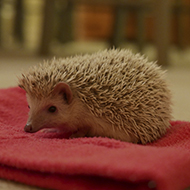
African pygmy hedgehog found on Tube station platform
While commuters often catch a glimpse of the odd mouse or pigeon enjoying life underground the busy streets of London, workers and customers using London Underground had quite a shock when they discovered a different animal waiting for a train – an African pygmy hedgehog in a hamster carrier on the Edgware Road platform, in Paddington, at around 8.15pm on 11 August.
RSPCA animal collection officer (ACO) Jill Sanders hurried to the Hammersmith & City line station in west London to collect the frightened animal. She said: “I was relieved that the little hedgehog was still alive as it was far too cold for him. He was crammed into a tiny cage and must have been very disoriented and frightened.”
The adult pygmy hedgehog – now called Paddington – is being cared for by a hedgehog carer in London. “It’s not clear whether he’s been abandoned or if his owner left him behind by mistake, so if anyone recognises him we urge them to get in touch by calling our appeal line on 0300 123 8018,” said Jill.
The RSPCA is concerned that the African pygmy hedgehog is one of Britain’s latest ‘pet crazes’ and the charity does not believe they should be kept as pets because this species has very specific needs.
An African pygmy hedgehog’s natural habitat is the semi-arid areas of central Africa and in captivity it needs a heated enclosure with a carefully controlled temperature between 24-30°C. Above 30°C, the hedgehog is likely to suffer heat stroke; whilst temperatures lower than 18°C can induce torpor – a form of hibernation – which is not advisable in captive pygmy hedgehogs.
Nicola White, RSPCA senior scientific officer for exotics, said: “African pygmy hedgehogs are solitary, nocturnal animals and will not give the companionship of many domesticated pets. They can live for eight to 10 years and so represent a considerable commitment; and if you keep two together it is likely that they will fight.
“These hedgehogs can travel large distances in the wild and anyone keeping one in captivity would need to allow for this natural behaviour – by providing as large an enclosure as possible, together with plenty of hiding places and an opportunity for digging, foraging and exercise.
“African pygmy hedgehogs have more specialised requirements than traditional domesticated pet animals, fundamentally linked to their natural environment in the wild. It is difficult to meet their needs adequately in a household environment and, where these needs can't be met, the animal really should not be kept.”
Anyone with any information about who may have owned ‘Paddington’ should call the RSPCA inspector appeal line on 0300 123 8018 and leave a message.
Image (C) RSPCA



 The Veterinary Medicines Directorate (VMD) is inviting applications from veterinary students to attend a one-week extramural studies (EMS) placement in July 2026.
The Veterinary Medicines Directorate (VMD) is inviting applications from veterinary students to attend a one-week extramural studies (EMS) placement in July 2026.